Recruiter vs HR: 5 Essential Distinctions
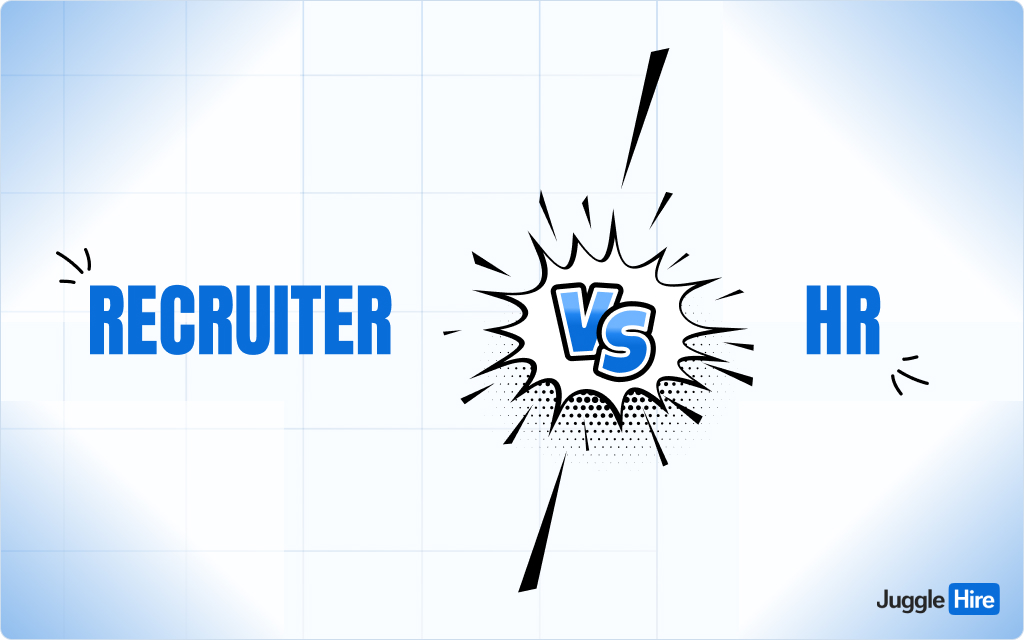
Recruiting and HR (Human Resources) are two vital functions in any organization. Each plays a crucial role in managing and developing the workforce.
Although they both deal with people, their focus areas are distinct. HR oversees the entire employee experience, from hiring to retirement, while recruiting is dedicated to finding and attracting the best talent to meet the organization’s needs.
In the recruiter vs HR debate, understanding their differences is essential for optimizing your company’s workforce management. Let’s explore the 5 essential distinctions that set these roles apart.
Recruiter: What Does It Mean?

A recruiter is someone who helps companies find the right people for their job openings. They look for candidates who have the skills, experience, and personality that match what the company needs.
Recruiters work in various settings like executive search firms, staffing agencies, or within a company’s own HR department. Their main goal is to attract and hire the best talent to ensure the company’s success.
Roles and Responsibilities of a Recruiter
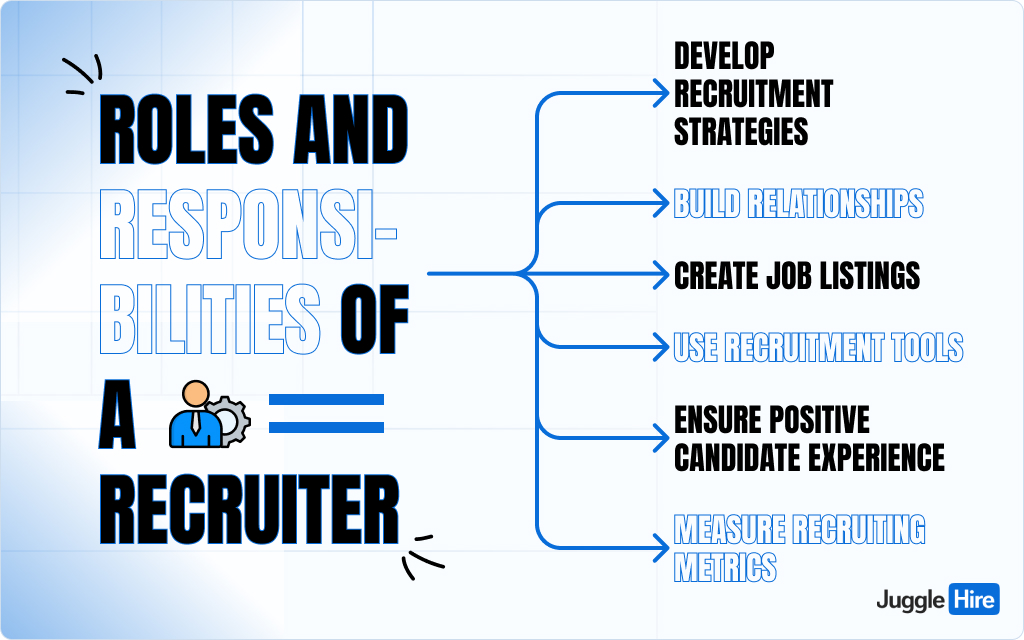
A recruiter’s roles and responsibilities are crucial for a company’s hiring success. Here’s a breakdown of what they do:
- Develop Recruitment Strategies: Recruiters create effective plans to meet the company’s hiring needs and goals.
- Build Relationships: They maintain strong connections with candidates, hiring managers, and other stakeholders throughout the hiring process.
- Create Job Listings: Recruiters write and post attractive and accurate job descriptions on various platforms to attract potential candidates.
- Use Recruitment Tools: They utilize tools like Applicant Tracking Systems (ATS), recruitment software, and social media to make the recruiting process more efficient.
- Ensure Positive Candidate Experience: Providing a positive and engaging experience for candidates is key, along with ensuring timely and clear communication.
- Measure Recruiting Metrics: Recruiters track and report on important metrics such as time to hire, cost per hire, quality of hire, and candidate satisfaction.
What We Understand by HR?

Human resources (HR) is the part of a company that handles everything related to its employees. This includes finding, recruiting, screening, and training job applicants. HR also takes care of employee benefit programs. Every business, no matter how big or small, needs an HR department to help keep things running smoothly.
Human resources, often called HR, is a vital part of any business. This department is responsible for finding, recruiting, screening, and training job candidates. HR also manages employee benefit programs. Essentially, HR works to boost employee productivity and address any workforce issues that may come up.
The term “human resource” was first introduced by American economist John R. Commons in 1893, but it wasn’t until the 20th century that HR departments began to address the needs and concerns between employees and employers formally. Whether a company is large or small, HR plays a crucial role in its success.
Roles and Responsibilities of an HR
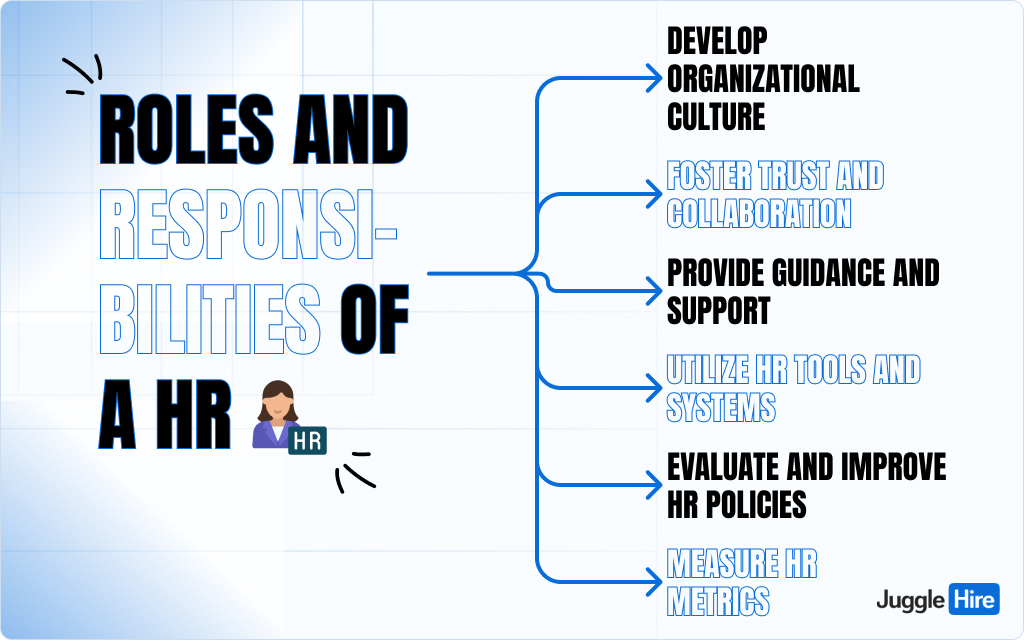
HR professionals have a range of important roles and responsibilities that help keep a company running smoothly. Here’s a look at what they do:
- Develop Organizational Culture: HR works to create and maintain a positive culture that aligns with the company’s values and goals.
- Foster Trust and Collaboration: They build and sustain trust and teamwork among employees, managers, and leaders within the organization.
- Provide Guidance and Support: HR offers advice and support on various issues, such as career development, conflict resolution, and employee feedback.
- Utilize HR Tools and Systems: They use tools like HR software, payroll software, and employee surveys to manage and enhance HR processes.
- Evaluate and Improve HR Policies: HR assesses and improves the effectiveness of policies, programs, and initiatives to ensure they align with the company’s strategy and vision.
- Measure HR Metrics: They track and report on metrics like employee satisfaction, retention, turnover, and productivity to gauge the health of the organization.
Please read –
Difference Between Recruiter and HR – 5 Major Areas of Differentiation
Before you proceed any further, we suggest taking a look at the following comparison chart so that you can quickly get an overall idea.
| Recruiter | HR (Human Resources) | |
| Primary Focus | Attracting and hiring candidates | Managing the overall employee experience |
| Key Responsibilities | Sourcing, screening, interviewing candidates | Onboarding, training, employee relations, benefits management |
| Time Frame | Short-term: Immediate hiring needs | Long-term: Employee retention and development |
| Metrics of Success | Time-to-fill, quality of hire, candidate satisfaction | Employee engagement, retention rates, productivity |
| Skill Set | Communication, interviewing, negotiation | People management, conflict resolution, strategic planning |
| Scope of Work | Narrow: Focused on recruitment | Broad: Includes all aspects of employee welfare and compliance |
| Role Clarity | Works closely with hiring managers to fill roles | Develops policies and manages workforce dynamics |
| Typical Salary | Average around $72,000 | Average around $100,000 for senior HR roles |
Understanding the differences between a recruiter and an HR professional can help clarify their unique roles within a company. Here are five major areas where they differ:
Also read –
HR vs Recruiter: Work Scope
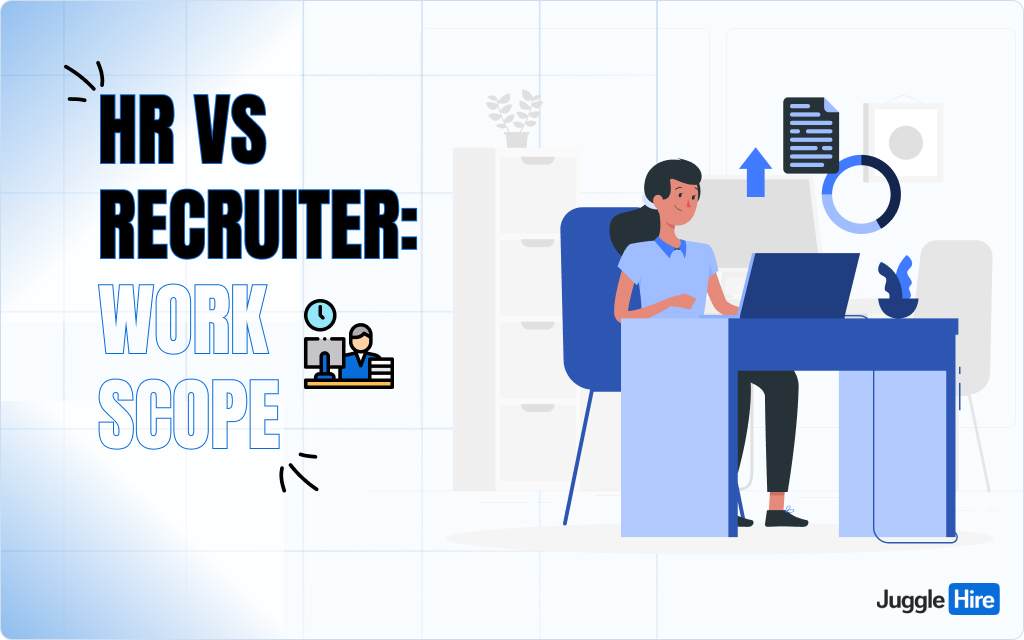
HR professionals manage the entire employee lifecycle, from hiring and onboarding to training, development, and retention. They handle everything related to employee welfare and organizational culture.
Example: An HR manager might develop a comprehensive training program for new hires to ensure they integrate smoothly into the company.
Recruiters focus solely on the hiring process. Their job is to attract, screen, and hire the best candidates for open positions.
Example: A recruiter might attend job fairs and use online platforms to find potential candidates for a new software engineer position.
HR vs Recruiter: Role Clarity
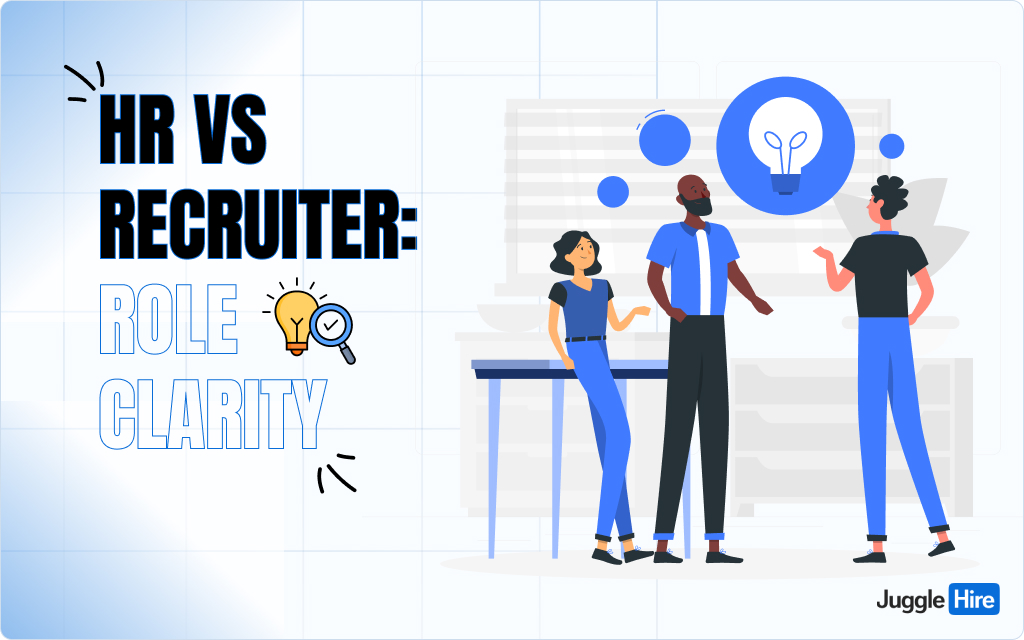
The HR team helps the company develop and retain talent. They are responsible for employee engagement, performance management, and compliance with labor laws.
Example: An HR specialist might conduct regular performance reviews and handle employee relations issues.
Recruiters are tasked with attracting and hiring talent. Their main responsibility is filling open positions with qualified candidates.
Example: A recruiter might work with hiring managers to understand job requirements and then source candidates who meet those criteria.
Recruiter vs HR: Time Frame
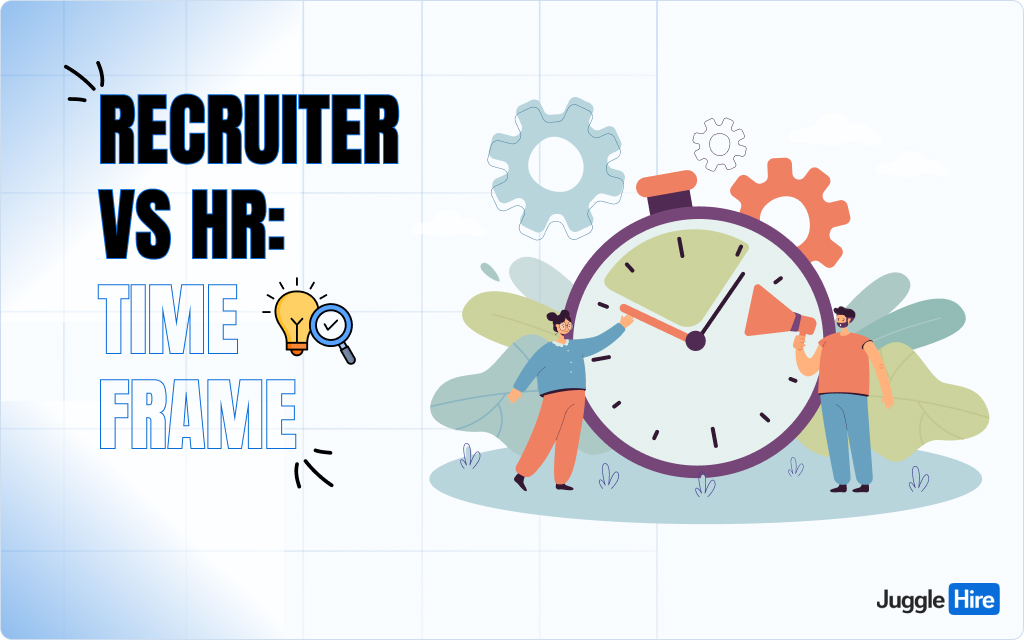
HR’s focus is long-term. They work on developing and maintaining a stable and productive workforce over time.
Example: An HR director might create a long-term strategy for employee development to ensure the company has a pipeline of skilled workers.
Recruiters work on a shorter time frame. They need to quickly identify and hire candidates for specific roles.
Example: A recruiter might have a goal to fill a vacant marketing manager position within 30 days.
Difference Between HR and Recruiter: Skill Set
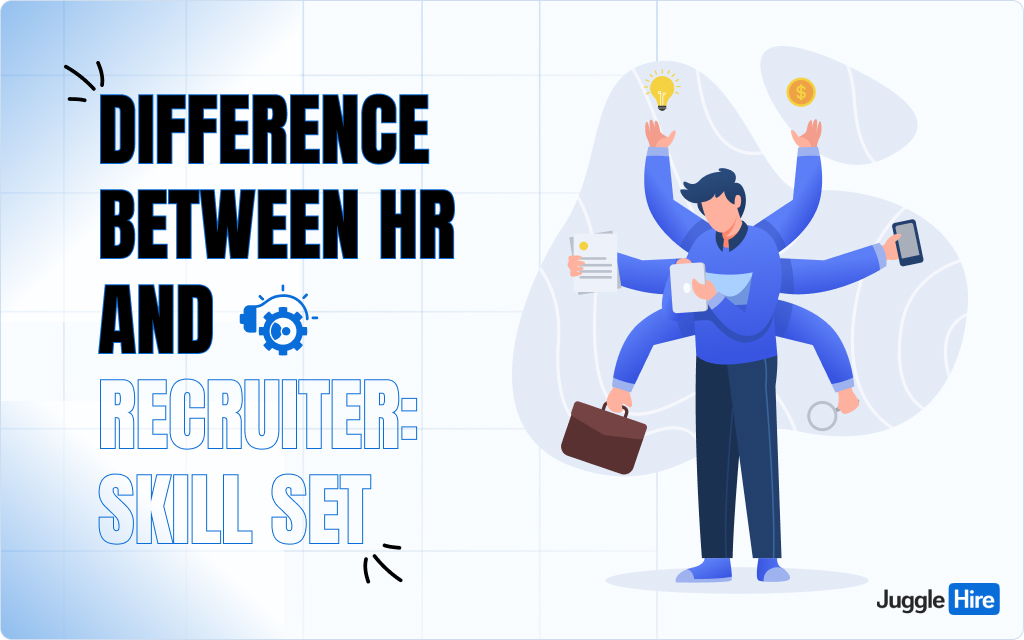
HR professionals need skills in people management, conflict resolution, and strategic planning. They must understand how to create policies that enhance employee satisfaction and productivity.
Example: An HR generalist might resolve conflicts between employees and develop policies to prevent future issues.
Recruiters need strong communication, interviewing, and negotiation skills. They must be adept at identifying talent and persuading candidates to join the company.
Example: A recruiter might negotiate salary packages with top candidates to secure their acceptance of job offers.
You might be interested in –
Difference Between Recruiter and HR: Salary
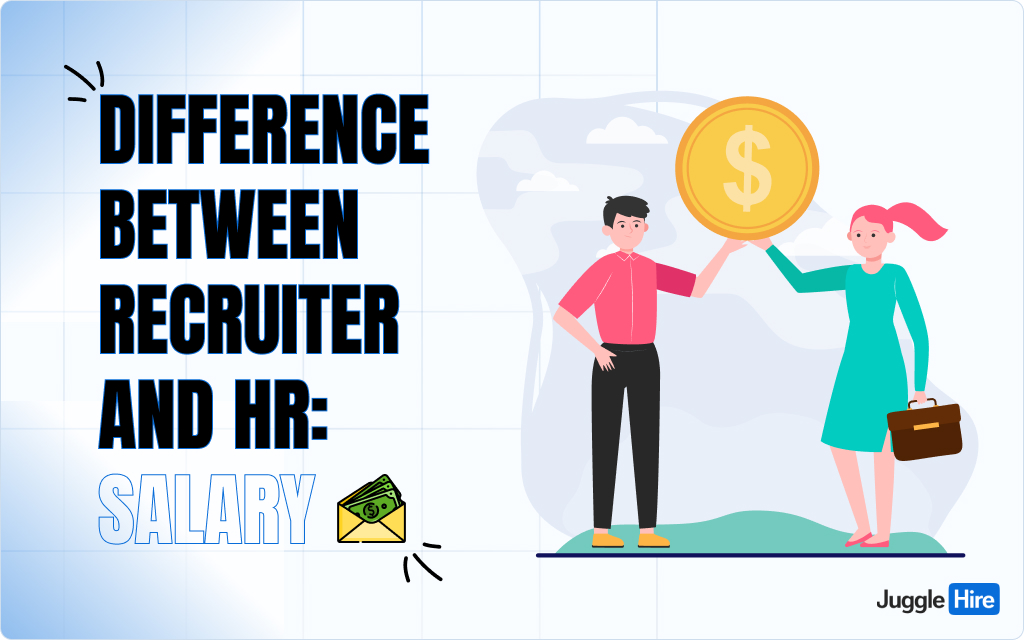
HR positions often require a bachelor’s degree in human resources, business, or a related field, and several years of experience. Senior HR professionals can earn an average of $61,690 annually, according to Talent.
Example: An experienced HR manager with a certification in HR management might earn a six-figure salary due to their expertise and strategic role in the company.
Recruiters typically need at least a high school diploma, though a degree is preferred, along with knowledge of employment laws. Their average salary is around $57,502 per year (source: Talent).
Example: A recruiter with a few years of experience and a good track record in hiring might earn a competitive salary but typically less than a senior HR professional.
Difference Between HR and Talent Acquisition
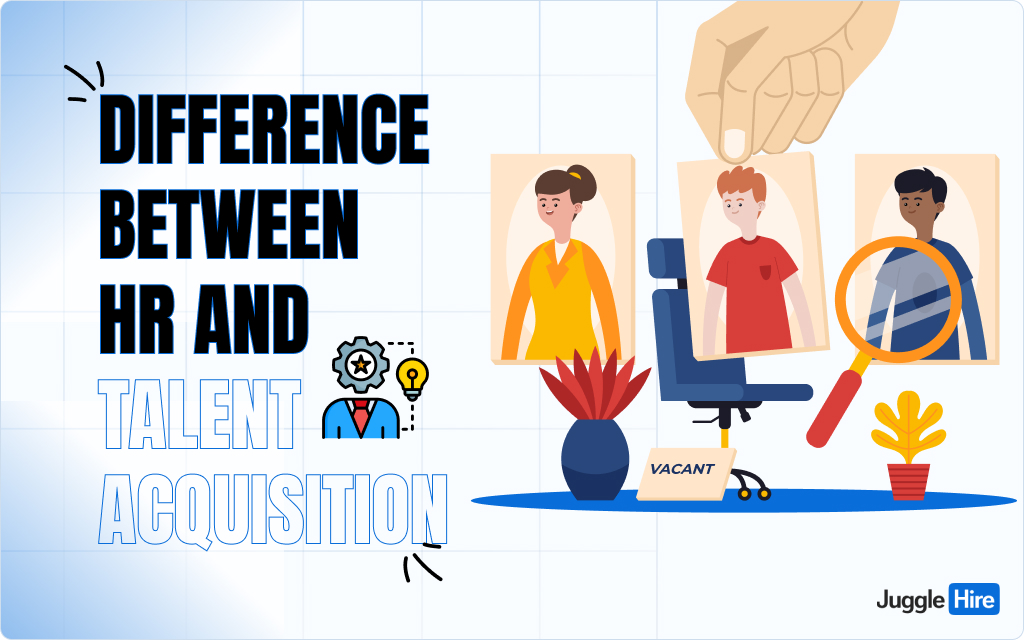
When managing a company’s workforce, people often mix up HR (Human Resources) and talent acquisition. While they both deal with employees, they serve different purposes. Let’s explore how they differ.
- Scope: HR is responsible for a wide range of tasks, including employee relations, benefits, and legal compliance. Talent acquisition focuses solely on recruitment and hiring, using various strategies to attract and engage candidates.
- Focus and Approach: HR takes a long-term, holistic view of workforce management, aiming to create a positive work culture and ensure employee satisfaction and retention. Talent acquisition, however, focuses on immediate hiring needs and filling open positions quickly and efficiently.
- Metrics of Success: HR measures success through metrics like employee engagement, retention rates, and overall productivity. Talent acquisition, on the other hand, looks at time-to-fill, quality of hire, and candidate satisfaction.
Both HR and talent acquisition are crucial for effective workforce management, but they have distinct roles. HR focuses on the overall well-being and management of current employees, while talent acquisition is dedicated to finding and hiring new talent.
Check out –
Bottom Line on the Difference Between Recruiter and HR
In the debate of recruiter vs HR, it’s clear that while their roles might overlap, they are fundamentally different. Recruiters focus on attracting and hiring candidates, while HR manages the entire employee lifecycle. Both roles are crucial for a company’s success and growth. Companies that can support both roles will benefit from a smooth hiring process and a well-managed workforce.
